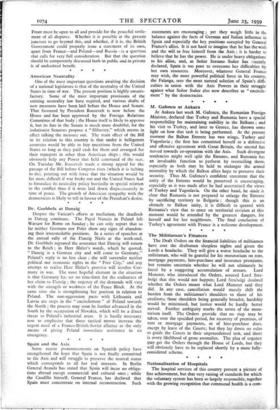American Neutrality One of the most important questions awaiting the
decision of a national legislature is that of the neutrality of the United States in time of war. The present position is highly unsatis- factory. Some of the most important provisions of the existing neutrality law have expired, and various drafts of new measures have been laid before the House and Senate. That favoured by President Roosevelt is now before the House and has been approved by the Foreign Relations Committee of that body ; the House itself is likely to approve it, but its fate in the Senate is much more doubtful, for the isolationist Senators propose a " filibuster," which means in effect talking the measure out. The main effect of the Bill in its relation to this country is that under it belligerent countries would be able to buy munitions from the United States so long as they paid cash for them and arranged for their transport in other than American ships ; this would obviously help any Power that held command of the seas. On Tuesday Mr. Roosevelt made a strong appeal for the passage of the Bill before Congress rises (which it is itching to do), pointing out with force that the situation would be far more difficult if war broke out and the United States had to formulate its neutrality policy hurriedly in special relation to the conflict than if it were laid down dispassionately in time of peace. The growth of American sympathy with the democracies is likely to tell in favour of the President's desire. * *










































 Previous page
Previous page